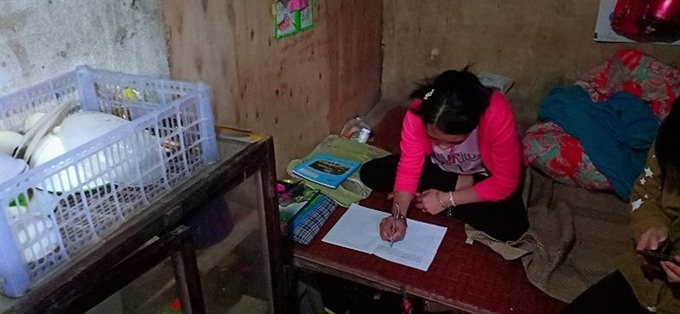Viet Nam News
HA NOI – In a makeshift hamlet in Ha Noi, many children go without an education because their parents are too poor, reported Giao Duc Viet Nam (Viet Nam Education) Newspaper.
The slum is called xom gam cau (under-the-bridge hamlet) because it is located under the famous Long Bien Bridge in Ha Noi’s Phuc Xa Commune, Long Bien District.
The hamlet is home to thousands of people who have migrated from many different areas of the country. It is often muddy and stinky, littered with plastic bags, wrapping papers and plastic boxes.
Most of the people who live there are quite poor. They work as porters in the nearby Long Bien Wholesale Market, or else as scrap collectors or any hard job they can find in the city, the paper said.
Although they work very hard, they rarely earn enough to cover their living expenses.
The adults work from dawn to dusk so they are not able to watch their children.
Most of the kids in the hamlet do not go to school, or have dropped out because their parents could not afford tuition fees, reported the paper.
In most of the hamlet’s families, the oldest children work to supplement their parents’ modest incomes while the younger children stay home and act as babysitters.
According to Le Thi Hoa, a resident of the hamlet for more than 15 years, “most of the children in the hamlet do not go to school because their families are too poor.”
“Their parents are migrants from the countryside,” Hoa said. “They had to bring the children along because no one at home could take care of them.”
Many children had to drop out of school in their hometowns to follow their parents to Ha Noi for work.
“I feel bad for the children, but it’s life,” she said.
For the poor migrants, tuition fees in Ha Noi are very high. Besides, they cannot make time bring their children to school in the mornings and pick them up ever afternoon.
“Most of the people here are not educated,” the woman said sadly. “They work as hired labourers year round. How can children grow up well in this environment?”
 |
| Nguyen Thi Thao chases her dream in the shabby room she shares with her mother. – Photo giaoduc.net.vn |
Dreams
There are many people stuck living under Long Bien Bridge, the paper reported.
One such case is of Nguyen Thi Dong and her daughter Nguyen Thi Thao.
The mother and daughter live in a tiny, damp and dark room. The room is unfurnished except for a bed.
Dong and her daughter migrated to Ha Noi years ago after her husband left her. In her hometown she had no job and no relatives, so she decided to earn money in the city.
Every night, the mother works as a porter in the market. She earns about VND70,000 – 100,000 (US$3-4.30) per night.
The income is so modest that their daily meals only consist of rice and vegetables, the paper said.
Thao is Dong’s second daughter and she has inborn heart disease. She did not go to school because she was very weak and regularly suffered heart pains.
“I did not have money for my daughter’s treatment or operation,” Dong said.
“Whenever she was in pain, I bought some medicines for her,” the mother said. “The thing I was most afraid was that if I died no one would be there to take care of her.”
One of her regrets was not letting her daughter to go to school. Thao had to drop out in the third grade.
“I really felt regret because I could not let her to go to school,” she said. “I am illiterate so my life has been disadvantaged. Now, my daughter is on my path.”
Despite not going to school, Thao loves literature.
Every day she stayed at home alone and wrote essays, poems and short stories.
Literature was a light of her difficult life.
Her burning desire and dream were to continue studying and become a writer and poet one day.
“Because of my health, I could not go to school like other children,” Thao said. “I was so sad.”
Recently, Thao returned to the classroom as part of a charity class in Phuc Xa Commune.
“In the class, I met many children who were as poor as I am,” she said. “This was the motivation for me to have faith in life.”
“I am determined to study and pursue my dream of being a writer,” she said. — VNS